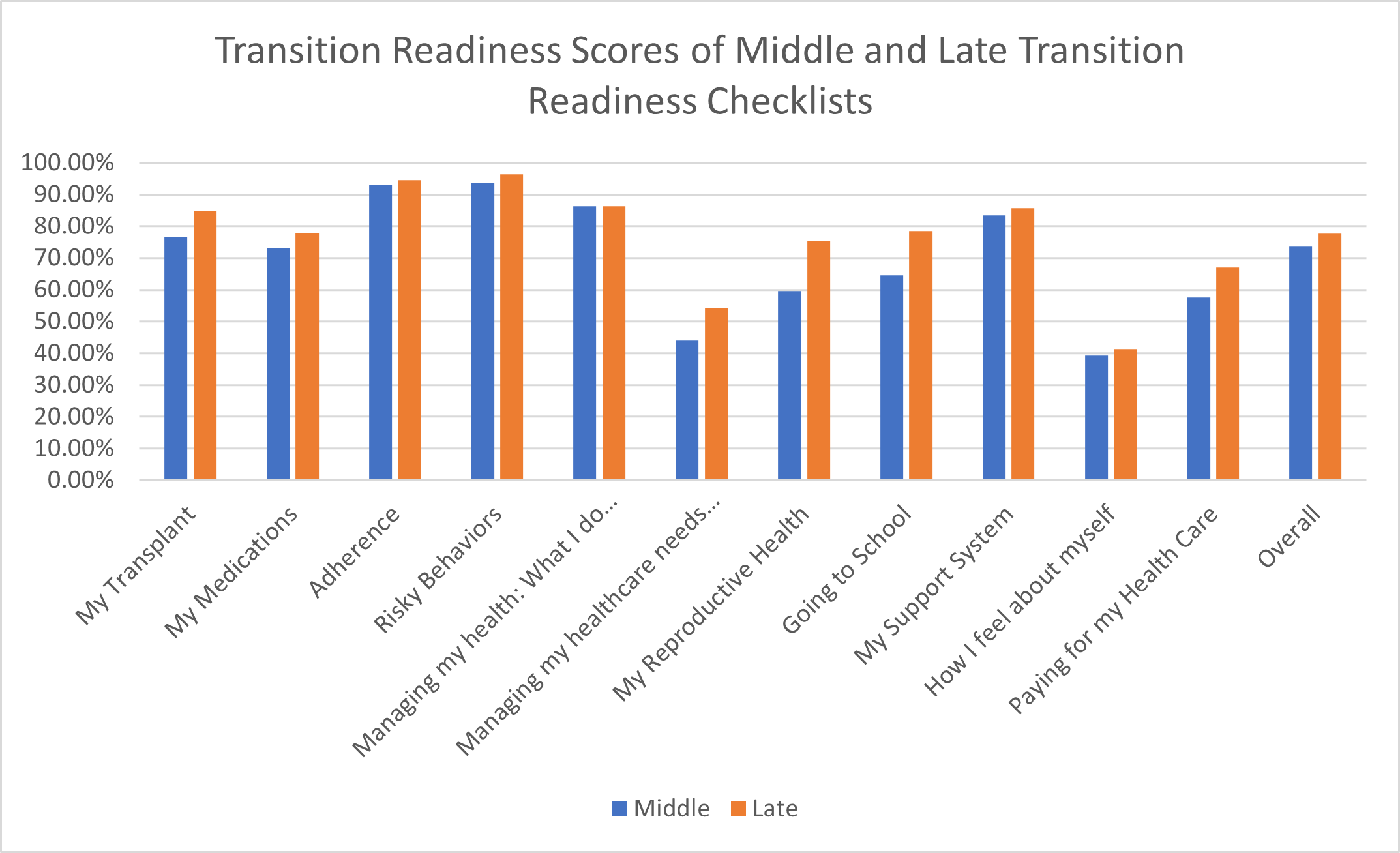Assessing readiness for transition among adolescent and young adult kidney transplant recipients
Leandra Bitterfeld1, Caitlin Peterson1,2.
1Solid Organ Transplant, Primary Children's Hospital, Salt Lake City, UT, United States; 2Pediatric Nephrology, University of Utah , Salt Lake City, UT, United States
Introduction: For adolescent and young adult (AYA) transplant recipients, the transition from pediatric to adult care is a time of highest risk for complications. There are no agreed upon readiness criteria for transition. The American Society of Transplantation Transition Readiness Checklist (TRC) is a tool designed to assess transition readiness (TR) among AYA transplant recipients. There are two versions: the Middle TRC for 14-16 year old’s and the Late TRC for those 17+ years old. There is no scoring system for the TRCs, which limits a clinician’s ability to rapidly appraise overall and domain specific TR.
The purpose of this study is to describe the development of a scoring system for a TRC for AYA kidney transplant recipients. Secondly, we describe overall and domain-specific TR among a large cohort AYA kidney transplant recipients.
Methods: This is a pragmatic, observational study of TR at a single center over five years. Some questions of the AST TR survey were modified to ensure that each question assessed a single concept. One question that was originally only part of the Late TRC and was added to the Middle TRC. A scoring system was developed such that higher scores reflects higher TR. A Likert-type scale ranging from 0-2 to 0-4 was used. Subscales and overall scores were totaled, and percentage scores were calculated for easier interpretation.
Results: The Modified Middle Transition Readiness Checklist (MMTRC) contains 38 items in 11 subscales and had a max score of 94 points. The Modified Late Transition Readiness Checklist (MLTRC) contains 43 items over the same 11 subscales, with a max score of 107 points. The MMTRC demonstrated good reliability, with a Cronbach’s α=0.84. The MLTRC demonstrated excellent reliability, with a Cronbach’s α=0.90.
43 children received the MMTRC at least once and 33 children (76.7%) completed it fully. Participants scored >90% in two subscales: adherence and risky behaviors. Scores were lowest in the “Managing my healthcare needs (self-advocacy)” (43.9%) and “How I feel about myself” (39.3%) domains. The overall score of the MMTRC was 73.8%. 59 children received the MLTRC at least once and 42 children (71.2%) completed it in its entirety. Patterns were similar across the MLTRC scores. Participants again scored >90% on adherence and risky behaviors. Scores were lowest in the “Managing my healthcare needs” (54.2%) and “How I feel about myself” (41.4%) domains. The overall score on the Late TR Survey was 77.6%.

Conclusion: This scored assessment of TR among AYA kidney transplant recipients allows for rapid in-clinic interpretation of TR. Participants had high levels of health-seeking behavior knowledge and risky behaviors, but less readiness for independent care management and low self-esteem. While transition programs have traditionally focused on education, our results demonstrate that programs should expand to also focus on behavior performance and emotional wellbeing.
[1] Kidney Transplant
[2] Pediatrics
[3] Transition
[4] Young adults
